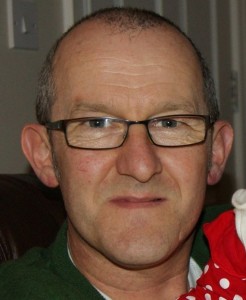The Mental Health Go to Guy
 This time last year, the College lost one of its true friends, Mark Logan.
This time last year, the College lost one of its true friends, Mark Logan.
Mark, if you did not know him, worked for Rehab in Galway, loved his family, music and Chelsea Football Club amongst many other things. In the Open Training College, Mark was the go to guy in the area of mental health, and in his time with the College, he also did some work on the Supported Employment programme. Every staff member who worked with Mark enjoyed his enthusiastic conversations, revelled in his active workshops and knowledge of the area, and were kept entertained with his eloquent stories (indeed many of the female staff members mentioned his accent).
Mark was a big advocate for the ASIST programme. His passion for ASIST motivated many students in the College to attend the 2 day course. ASIST (Applied Suicide Intervention Skills Training) is a two-day interactive workshop in suicide first-aid. The course is suitable for all kinds of caregivers including social care workers, health workers, teachers, community workers, Gardai, youth workers, volunteers, people responding to family, friends and co-workers. Mark felt the course was an essential tool to have in your tool kit if you worked in any part of human services and indeed beyond. The idea of first aid for your mental health is relatively new; but it works in the same way as the standard first aid. You support the person until professional help can be accessed.
Mark was also an advocate for the recovery movement. The recovery movement captured the drive to make mental health services more person centred, more consumer friendly, putting the person in the driving seat for their own treatment. The person is central to, and in control of, their recovery processes; the person feels listened to and is encouraged to explore a full range of options and the person experiences non-stigmatising, non-judgemental services within mainstream community bases. The key to successful recovery is the presence of meaningful relationships in the person’s life.
The recovery movement is built on themes like empowerment, self management and the person having the ability to be able to live and interact despite experiencing symptoms (social recovery). The recovery movement is based on the told experience of people. The concept itself is nearly 200 years old and can be traced back to John Perceval (a son of a British prime minister) who wrote of his personal recovery from the psychosis that he experienced from 1830 until 1832, a recovery that he obtained despite the “treatment” he received from the “doctors who attended him. (http://www.recoverywithinreach.org/Recovery/history.) The movement has grown and now is seen as a key element of quality mental health services.
Mark’s focus was on ensuring everyone’s mental health was on the agenda. The importance of ensuring in troubled times that everyone was aware of their own mental health and the mental health of everyone around them. To quote an appreciation of Mark written in a Galway newspaper after his passing; ‘Mark has the beautiful and rare gift of actually caring for those around him and listening intently to their stories’. The man practiced what he preached.
Thank you for reading this short piece on Mark. He will be and is being missed by all at the Open Training College. The College would like to send its thoughts nearing the one year anniversary of Mark’s passing to his family and friends
If you are interested in more details on the ASIST programme go to .http://www.nosp.ie/html/training.html.
The recovery movement is covered as part of the College’s elective series on the BA Applied Social Studies (Disability). Click here to find out more.
